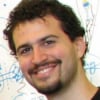Erez Lieberman Aiden

Erez Lieberman Aiden
Erez Lieberman Aiden, formerly known as Erez Lieberman, is an American research scientist active in multiple fields related to applied mathematics. He is an assistant professor at the Baylor College of Medicine, and formerly a fellow at the Harvard Society of Fellows and visiting faculty member at Google. Using mathematical and computational approaches, he has studied evolution in a range of contexts, including that of networks through evolutionary graph theory and languages in the field of culturomics. He has published...
NationalityAmerican
ProfessionMathematician
CountryUnited States of America
There was a period in my life when I was eating ramen non-stop. These days, less so. Once you have a kid, you end up eating a lot of foods with broccoli in them.
My wife and I started a program called Bears Without Borders. We raise money and hire local artisans to make stuffed animals and distribute them in their communities.
The best types of problems are those that seem harder at first than when you think about it.
I don't view myself as a practitioner of a particular skill or method. I'm constantly looking at what's the most interesting problem that I could possibly work on. I really try to figure out what sort of scientist I need to be in order to solve the problem I'm interested in solving.
The immune system constantly creates genes on the fly that are specific to the things that show up in the body. It's amazing.
One of the central mysteries of biology is why the genome is largely identical from cell to cell, even though cells do different things.
Much of contemporary science is really the length and shadow of the technology we apply.
It's so hard to figure out what's going on in biological systems. You just can't see them.
Ladies and gentlemen, a picture is not worth a thousand words. We found some pictures that are worth 500 billion words.
I enjoyed mathematics from a very young age. At the beginning of college, I had this illusion, which was kind of silly in retrospect, that if I just understood math and physics and philosophy, I could figure out everything else from first principles.
The top 10 verbs in the English language are all irregular, even though irregular verbs make up only 3 per cent of the language.